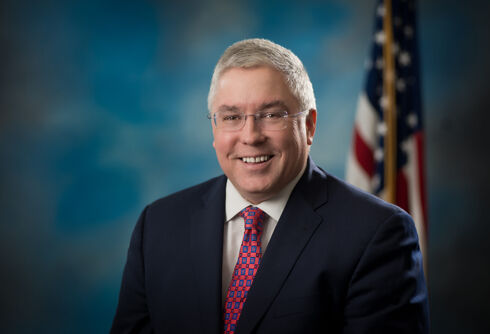IOWA CITY, Iowa — An Iowa man violated the state’s HIV transmission law because he didn’t disclose he was infected, even though his partner did not acquire the virus and their encounter posed a low risk of transmission, an appeals court ruled Wednesday.
The ruling against Nicholas Rhoades – who was initially sentenced to the maximum 25 years in prison – was a bitter disappointment to groups challenging state laws that criminalize HIV transmission.

Advocates have seized on Rhoades’ prosecution as a particularly egregious example of how the laws can be overly harsh and based on outdated scientific understanding of HIV, the virus that causes AIDS.
Christopher Clark, a Chicago-based attorney for gay rights group Lambda Legal, which is representing Rhoades, called the ruling an injustice and said he was considering asking the Iowa Supreme Court for review. Another gay rights group, One Iowa, said lawmakers must repeal or amend a law that “targets and denigrates Iowans living with HIV and AIDS.”
Never Miss a Beat
Subscribe to our newsletter to stay ahead of the latest LGBTQ+ political news and insights.
“Iowa’s draconian HIV criminal transmission law is not only retaliatory, it is outdated and needs to be revised,” One Iowa Executive Director Donna Red Wing, said.
Rhoades, 39, had a sexual encounter with a man he met in an online chat room in 2008. Rhoades drove from his home in Waverly to the man’s home in Cedar Falls, where he received oral sex without wearing protection but put on a condom before having sex. Within days, the man learned from a friend that Rhoades had HIV and contacted police. He eventually tested negative for HIV, but he supported Rhoades’ prosecution.
Rhoades eventually pleaded guilty to criminally transmitting HIV, a class B felony. A judge sentenced him to the maximum 25 years in prison.
But after an outcry over the sentence, the judge reconsidered and freed Rhoades after roughly 18 months behind bars. Rhoades is on probation and required to register for life as a sex offender.
Lambda Legal subsequently started representing Rhoades in seeking to overturn his conviction. Its lawyers argued that Rhoades would not have pleaded guilty if his original lawyer had advised him that the charge required proof that he intentionally exposed his bodily fluid in a manner that could transmit HIV.
Rhoades argued that he did not have the necessary intent, noting he did not ejaculate during oral sex and wore a condom during sex. A coalition of advocates for HIV patients, including the HIV Law Project, supported the argument in a friend-of-the-court brief, saying unprotected oral intercourse poses an extremely low risk of transmission and that there are no documented cases of such transmission without ejaculation.
But in a 3-0 ruling, an Iowa Court of Appeals panel rejected that argument. Judge Richard Doyle wrote that while the risk appears low, the transmission of HIV through unprotected oral sex is still possible. Rhoades’ physician testified that while Rhoades’ viral load was undetectable at the time, there was still a risk, Doyle wrote.
The court declined to address the question of whether someone could be prosecuted under the law if he wore a condom during sex.
Clark, Rhoades’ attorney, said he was disappointed in the ruling.
“They embrace the idea that you can put people in jail for behavior that represents absolutely no risk to people. That is a travesty,” he said. “We’re left with a situation we’re still puzzling over: What is the infectious bodily fluid that is the basis of this conviction? There isn’t one.”
Clark criticized the appeals court for saying the Legislature, not the courts, should be responsible for updating the law to reflect medical advancements. He said it was the court’s job to interpret the intent requirement, which requires judges to understand those matters.
Iowa Attorney General Tom Miller’s office, which defended Rhoades’ prosecution, supported the ruling. But spokesman Geoff Greenwood noted Miller’s office worked with lawmakers last session during an unsuccessful attempt to update the statute “to reflect a growing body of research about HIV transmission” and would continue those efforts.
This material may not be published, broadcast, rewritten, or redistributed.













